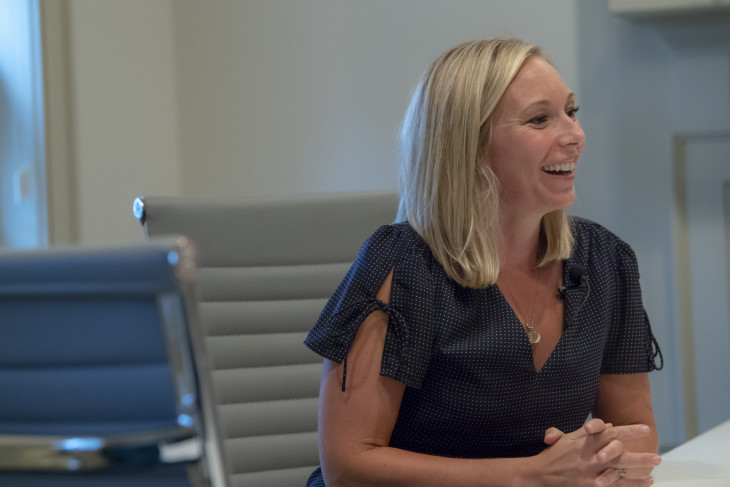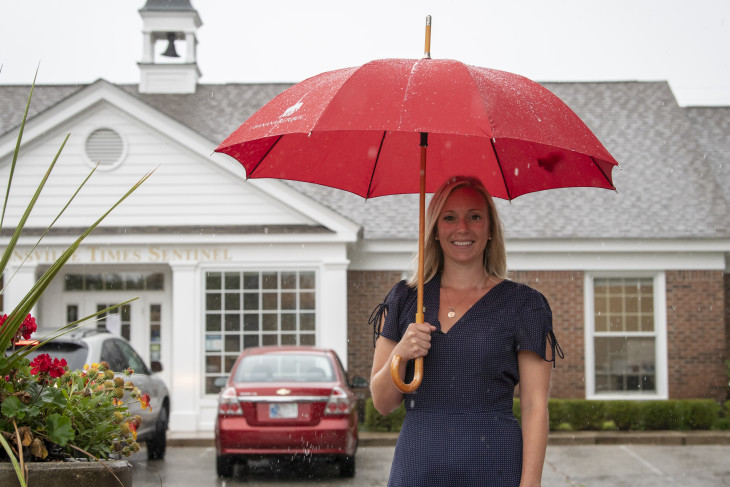Megan Casey Glover was a communication major at DePauw who figured she’d go to law school after her graduation in 2004, emulating her lawyer parents, Mary Butt and John Casey ’67.
But when the time came, “it just didn’t feel right,” she says. So she stayed in Greencastle, running the Young Alumni Association for her alma mater. She called Angie Hicks ’95 to solicit a donation and told Hicks “I’m really interested in your business.”
One thing led to another and Glover went to work for 3 ½ years for Hicks’s company, Angie’s List, the home services referral website, where she “caught the entrepreneurial bug.”
And although she “never set out to start a business,” Glover has, many years later, done just that, and in such fine fashion that she has won an award and financial support from AOL co-founder and former CEO Steve Case and attracted the attention of former President Barack Obama.
But let’s not get ahead of ourselves.

From Angie’s List, Glover moved into a series of marketing jobs, always clambering to join startups, “the earlier the better.” She had implemented the Compendium corporate blogging platform at Angie’s List and so eagerly responded to overtures from Alison Sales Roach ’03 to become employee No. 5 for that startup. Compendium was founded by Chris Baggott, who previously sold ExactTarget to Salesforce for $2.5 billion; he later sold Compendium to technology giant Oracle. (Baggott’s son Matthew is a first-year DePauw student.)
After that, Glover was off to Delivera, a marketing company, and then to two DePauw-connected companies – RICS Software, for which Jason Becker ’04 is chief executive officer, and DyKnow, for which his father, David Becker ’75, is CEO. (David Berque, a computer science professor, associate vice president of student academic life and dean of academic life at DePauw, holds two patents on the DyKnow software, with which teachers may provide electronic class notes to their students.)
“From there, I had two little kids and I said I’m going to go out on my own and do some consulting,” Glover says. As freelancers do, she was having coffee one day with Baggott and they began discussing the crisis in Flint, Mich., where 100,000 residents were exposed to lead-contaminated water.
“Chris asked me, ‘are you following any of this?’ I’m like, ‘Yeah, you can’t not follow it; this is terrible.’ My kids were 2 and 5 at the time. And he said, ‘Have you ever thought of it? Do you know if the water that your kids are drinking is safe?’ I said, ‘Chris, I’ve never thought about it. I’m 34 years old; I just expect that I pay for my water so it’s safe and, living in Indiana, we’re always going to have plenty of it. I’ve never thought about water quality.’ I said, ‘You can’t stop thinking about it now, right?’
She didn’t. Couldn’t. She researched drinking water regulations and water testing. She learned that the industry was antiquated and the options for homeowners to test their water were slim – and, for most, prohibitively expensive. As a person who is “always conscious of what we’re putting in our bodies,” she was troubled. But she also saw opportunity.
I just expect that I pay for my water so it’s safe and, living in Indiana, we’re always going to have plenty of it. I’ve never thought about water quality.
In April 2016, she, Baggott and a third partner pooled $130,000 to launch 120WaterAudit. The idea was homeowners would subscribe to have their water tested every 120 days. The idea faltered and they tweaked the formula, selling single-use kits to homeowners, who would receive them by mail, take a water sample and return it by mail.
Homeowners can still purchase kits, but the business has evolved significantly, now providing software services to civic entities – public water systems, cities, school districts and states. Glover had been equipped with a clipboard the first time she conducted sampling in a school district, and she came away thinking that there had to be a better way to manage the massive amount of information that would have to be gathered – inventories of lead-contaminated lines and testing results.
The company was developing a software prototype when she met someone from the Indiana Department of Environmental Management, who referred her to the person who was overseeing the state’s then-new lead-testing program in public schools. He had been looking for software to manage the work and the state ended up purchasing it from 120WaterAudit for $500,000. Just days before, the company landed a $300,000 deal with the Pittsburgh Water and Sewer Authority.
Other civic entities, compelled by federal law, have followed. The company has 16 employees and Glover says she expects to grow to 35 employees and triple revenue in the next few years.
About a year ago, Case came to Indianapolis for his investment firm Revolution LLC’s Rise of the Rest competition, which seeks out promising tech startups outside Silicon Valley with a plan to invest in them. Glover was among the Indianapolis-area entrepreneurs given the opportunity to present; Case invested $100,000.
Then last February, Glover was among the Rise of the Rest recipients Case invited to attend a two-day conference in Washington D.C., where she met Obama.
“It was kind of an out-of-body experience, politics aside,” she says. “That was my first small roundtable with someone of that stature. He was incredibly thoughtful and he didn’t need to spend the hour and a half that he did with us five entrepreneurs, but he did.”
Browse other stories
-
Athletics
-
Football - 336 Students Named to 2025 Spring Tiger Pride Honor Roll
-
Football - DePauw-Record 190 Student-Athletes Named to NCAC's Dr. Gordon Collins Scholar-Athlete Honor Roll
-
Football - DePauw Unveils 2025 Athletics Hall of Fame Class
More Athletics
-
-
News
-
Outstanding scholars named to Spring 2025 Dean's List
-
Alumni News Roundup - June 6, 2025
-
Transition and Transformation: Inside the First-Year Experience
More News
-
-
People & Profiles
-
11 alums make list of influential Hoosiers
-
DePauw welcomes Dr. Manal Shalaby as Fulbright Scholar-in-Residence
-
DePauw Names New Vice President for Communications and Strategy and Chief of Staff
More People & Profiles
-
-
Have a story idea?
Whether we are writing about the intellectual challenge of our classrooms, a campus life that builds leadership, incredible faculty achievements or the seemingly endless stories of alumni success, we think DePauw has some fun stories to tell.
-
Communications & Marketing
101 E. Seminary St.
Greencastle, IN, 46135-0037
communicate@depauw.eduNews and Media
-
News media: For help with a story, contact:
Bob Weaver, Senior Director of Communications.
bobweaver@depauw.edu.
